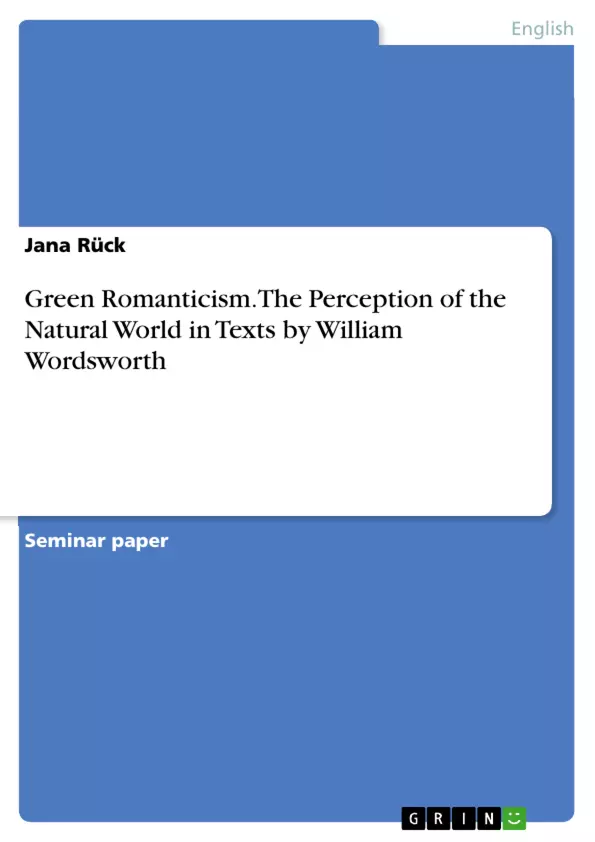This paper deals with individual perceptions of the natural world and different positions of oneself within nature. Therefore, it presents an overview of British Romanticism and pictures different concepts of this Era. Important historical events and ecological approaches will be discussed, in order to connect these concepts to Romantic Ecocriticism. The paper focuses on two selected texts by two prominent authors from the Era of British Romanticism; William Wordsworth and Dorothy Wordsworth. In detail, their different individual representations of the natural world and their own standing within nature will be analysed and compared; Eventually these findings will be connected to ecocritical concepts.
This paper is supported by various authors of studies in Romantic Ecocriticism and British Romanticism. Among others, John C. McKusicks and Kevin Hutchings' essays will help portraying the evolution of Green Romanticism. N. Hallam and Scott Hess are supporting this writing in terms of analysing the ecological concepts of respective literary works by the presented authors. Finally, a step into the future of the natural world will be taken, concerning present environmental hazards and their long term consequences for the humankind and the natural world, itself.
Inhaltsverzeichnis (Table of Contents)
- Introduction
- The Evolution of Green Romanticism
- Literary Concepts and Important Dates in British Romanticism
- Ecological Approaches to British Romanticism
- Two Perceptions of the Natural World in Romanticism
- William Wordsworth's Perception of the Natural World
- Williams Life and his Literary Works
- Perception of Nature in I Wandered Lonely as a Cloud
- Dorothy Wordsworth's Perception of the Natural World
- Dorothy's Life and her Literary Works
- Perception of Nature in Grasmere Journals
- Comparing Perceptions of Nature in I Wandered Lonely as a Cloud and Grasmere Journals
- William Wordsworth's Perception of the Natural World
Zielsetzung und Themenschwerpunkte (Objectives and Key Themes)
This paper examines the individual perceptions of the natural world held by two prominent figures from the era of British Romanticism: William Wordsworth and Dorothy Wordsworth. By analyzing their respective representations of nature and their own positions within it, the paper aims to connect these findings to ecocritical concepts. The paper also provides an overview of British Romanticism, discussing its key historical events, literary developments, and ecological approaches.
- The evolution of Green Romanticism and its connection to British Romanticism.
- The different perceptions of nature held by William Wordsworth and Dorothy Wordsworth, as reflected in their literary works.
- The relationship between human beings and the natural world in the context of Romantic Ecocriticism.
- The impact of the Industrial Revolution on the perception of nature during the Romantic era.
- The potential consequences of human-caused environmental hazards for the natural world and humankind.
Zusammenfassung der Kapitel (Chapter Summaries)
The introduction establishes the paper's focus on individual perceptions of nature and the importance of understanding how these perceptions influence our relationship with the natural world. It also highlights the growing concern about human-caused environmental hazards and their impact on both the natural world and humankind.
The chapter on the Evolution of Green Romanticism traces the development of Romantic ecocriticism, highlighting key literary concepts and important dates in British Romanticism. It explores how the Industrial Revolution impacted British society and how nature emerged as a haven for the imagination during this period.
Schlüsselwörter (Keywords)
The key themes and concepts explored in this paper include British Romanticism, Green Romanticism, Romantic Ecocriticism, William Wordsworth, Dorothy Wordsworth, nature, perception, individual, society, industrial revolution, environmental hazards, and the human relationship with the natural world.
- Arbeit zitieren
- Jana Rück (Autor:in), 2021, Green Romanticism. The Perception of the Natural World in Texts by William Wordsworth, München, GRIN Verlag, https://www.hausarbeiten.de/document/1263054


